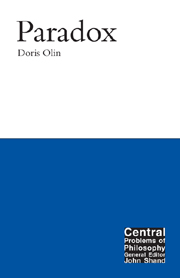Book contents
4 - The preface paradox, fallibility and probability
Summary
The virtue of consistency
Is consistency always an epistemic virtue? The traditional view has been that consistency is essential to rationality, that it is something to be aimed at in all our beliefs. Inconsistent beliefs, it is maintained, are always unreasonable. Call this “the conservative position”. The central issue of this and the following chapter is whether the conservative stance on consistency is correct.
First, some terminology. A set of statements is inconsistent if it is logically impossible for all the statements in the set to be true. For instance, the statements
(i) Pierre is a politician.
(ii) All politicians sometimes lie.
(iii) Pierre never lies.
cannot all be true. Inconsistency is to be distinguished from contradiction. Two statements are contradictory if they are of the form:
P, 〜P
Clearly, no two statements in the above set contradict each other. All contradictory statements are inconsistent, but not conversely.
Recently, there has been a flurry of discussion on inconsistent belief as philosophers have felt the need to rethink the traditional view of consistency. The focus of this and the next chapter is a group of paradoxes that are responsible for the controversy. What these paradoxes have in common is that each apparently offers a demonstration that inconsistent beliefs may be epistemically faultless, that they may be perfectly reasonable. Each is a type I paradox, and each is controversial.
The consistency paradoxes are particularly disturbing.
- Type
- Chapter
- Information
- Paradox , pp. 61 - 78Publisher: Acumen PublishingPrint publication year: 2002

